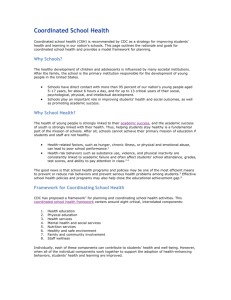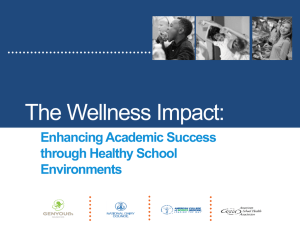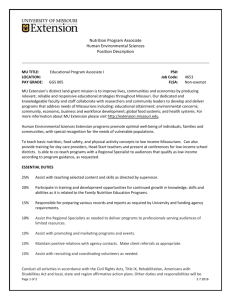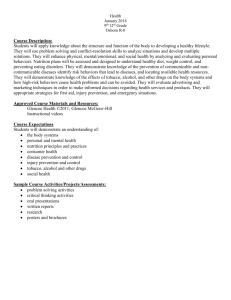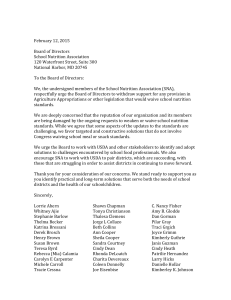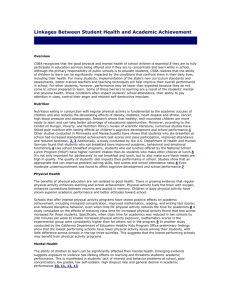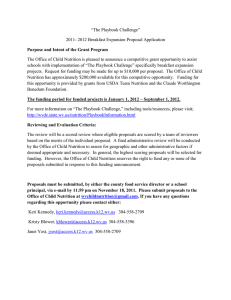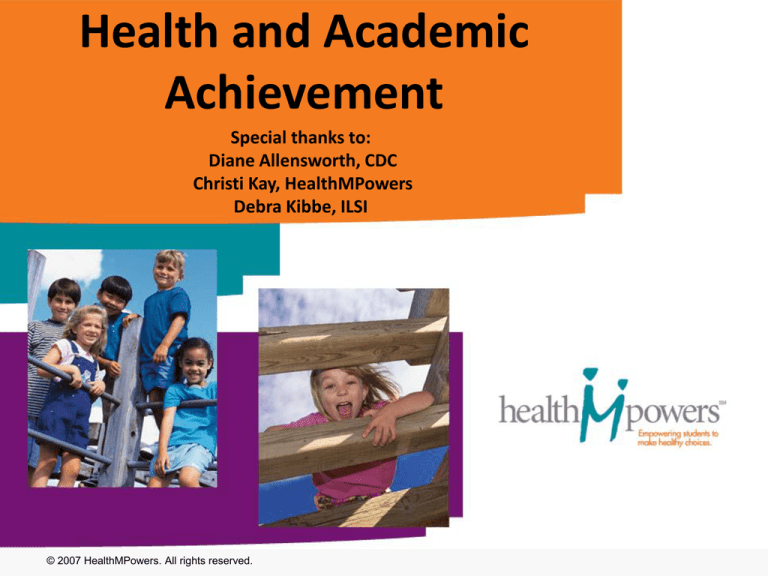
Health and Academic
Achievement
Special thanks to:
Diane Allensworth, CDC
Christi Kay, HealthMPowers
Debra Kibbe, ILSI
© 2007 HealthMPowers. All rights reserved.
Key Messages
Childhood obesity is a national crisis
Health is academic
A coordinated, multi-component, evidencebased approach is the best way to make a
difference
Change is happening…more to do
Poor nutrition and inadequate physical
activity in children has far reaching
consequences…
Health consequences
•
•
•
•
•
•
Cardiovascular risks
Hypertension
Type 2 diabetes
High blood cholesterol
Respiratory ailments
Orthopedic issues
Psychological consequences
•
•
•
•
Self-esteem
Withdrawal
Anxiety
Poor body image
Academic Consequences…
Attendance
Classroom behavior
Cognitive development
Test scores
Academic performance
Therefore, healthful living is as important to
well being and quality of life
as it is to academic achievement.
The Science of Health & Learning:
Physical Activity
Physical Activity (PA)
•
Stimulates learning
•
Fitness is significantly related to school
achievement
•
Vigorous physical activity, specifically, boosts
performance
The Science of Health & Learning:
Physical Activity
Physical Activity (PA)
•
No negative impact of enhanced physical
education (both ↑ time & quality) on academic
performance
•
Both reading and math scores improve for
“poorly adapting” students when PA increases
during school day
•
Classroom PA leads to significant, systematic
improvement in on-task behavior
The Science of Health & Learning:
Nutrition
Nutrition
• Affects learning AND behavior
• Breakfast improves attention, memory, test
performance, attendance & weight control
• Food insufficiency is related to poor behavior
and academic function in low income children
• Food quality and frequency may relate to
positive academic effects
The Science of Health & Learning:
Nutrition
Nutrition
• Children who participate in school nutrition
programs are less likely to have discipline
problems.
• School breakfast participants, 3rd-5th grade,
realized gains in math, reading and vocabulary
• Reduced rates of tardiness and absenteeism
References
Karsting K. Exploring the evidence-base for the relationship between health and
learning. Nebraska DHHS, Division of Public Health. Poster presented at American
School Health Assn, Denver CO. Oct 2010.
Murray NN, Garza JC, et. al. Fitness and academic achievement among 3rd and 4th
grade students in Texas. Paper presented at ACSM annual meeting, Indianapolis
IN. May 2008.
Tomporowski PD. Cognitive and behavioral responses to acute exercise in youth: A
review. Pediatric Exercise Science 2003.
Sallis JF, McKenzie TL, et. al. Effects of health-related physical education on
academic achievement: Project SPARK. Research Quarterly for Exercise and Sport,
1999.
Mahar MT, Murphy SK, et. al. Effects of a classroom-based program on PA and ontask behavior. MSSE, 2006.
Buzby JC, Guthrie JF, Kantor LS. Evaluation of the USDA fruit and vegetable pilot
program: report to Congress. Washington, DC: Economic Research Service, 2003.
Meyers AF, Sampson AE, et. al. School breakfast program and school performance.
American Journal of Diseases of Children, 1989.
Rampersaud G, Pereira M, et. al. Breakfast habits, nutritional status, body weight,
and academic performance in children and adolescents. JADA, 2005.
Percentage of U.S. High School Students Getting Mostly A’s or
Mostly B’s and Mostly D’s or F’s*
Who Engage in Selected Health Risk Behaviors
Mostly A's
100
Mostly B's
Mostly C's
80
% of students
60
40
35
11
14
34
45 47
46
44
31
22
20
58
54
46
Mostly D/F's
67
66
39
31
28
19
12
10 12
16
21
0
Carried a Weapon
Current cigarette user
Current alcohol use
Ever had sexual
intercourse
Did not eat for 24 or Watched television 3 or
more hours to lose
more hours per day
weight or to keep from
gaining weight
Health Risk Behaviors
Source: CDC available at www.cdc.gov/healthyyouth. Data based on YRBS, 2003
Other Resources
See Training Manual (Tab 5)
Making the Case for School Health Resource List
The Association Between School-Based Physical
Activity Including Physical Education and Academic
Performance
Physical Inactivity and Unhealthy Dietary Behaviors
and Academic Achievement


